Urgent action does not disgrace the mission-on-the-spot record of Wuhan Youfu Hospital’s anti-epidemic work
Jingchu. com client-Jingchu. com news (correspondent Wang Mian) Since Wuhan Youfu Hospital was listed as the designated treatment hospital for patients in COVID-19 on February 14th, Wuhan Veterans Affairs Bureau urgently mobilized all forces in the system, completed various transformation tasks in time, and increased 900 beds within 4 days, providing a strong guarantee for winning the epidemic prevention and control war. As of February 21st, Wuhan Youfu Hospital has treated 256 patients with COVID-19.
Firmly invest in the fight against epidemic prevention and control
Youfu Hospital is only 200 meters away from the seafood market in South China. Since December last year, it has been receiving patients with fever of unknown reasons. Faced with the shortage of resources in the hospital and the inability to properly treat it, the party group of Wuhan Veterans Affairs Bureau immediately led the Party Committee of Youfu Hospital to seriously study the feasibility of hospital reconstruction, carefully calculate the beds that can be vacated, integrate and adjust the wards, and treat patients according to the maximum carrying capacity. At the same time, it reported the relevant situation of the special care hospital to the municipal party committee and municipal government, and applied to treat patients in COVID-19 as a designated hospital.
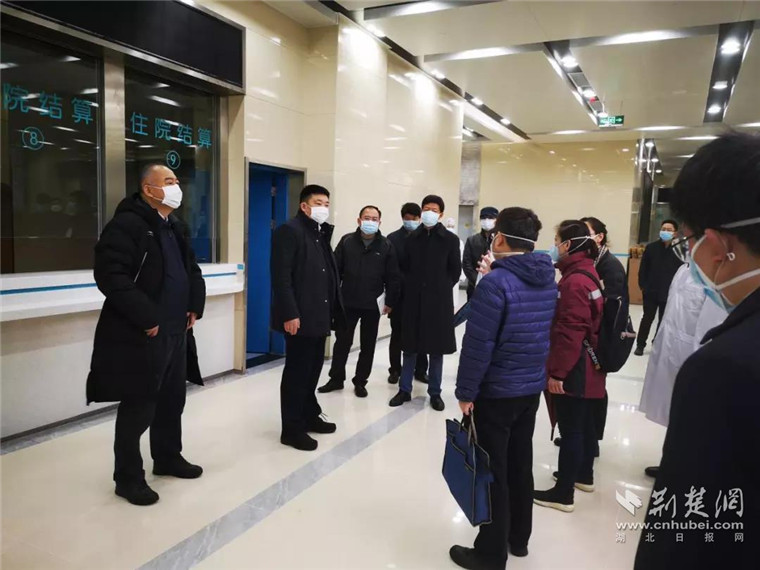
City leaders went to the special care hospital for investigation. Photo courtesy of correspondent
On February 14th, the city leaders approved this hospital as a designated hospital for patients in COVID-19. At the same time, the hospital received the task of preparing 900 beds before February 17. Since then, a race against time, greatly enhance the fighting capacity of COVID-19 patients to save the assault war in the position of the special care hospital.
Race against time to complete relay for life.
Faced with the arduous task of increasing 900 beds in four days, the Municipal Bureau of Veterans Affairs quickly blew the assembly number, organized all the staff of the special care hospital (except the medical staff who care for the existing inpatients) and more than 330 staff members who did not undertake the epidemic prevention task in the sinking community, such as the municipal bureau organs, military rest offices and military rest centers, and mobilized more than 20 middle-level cadres of retired soldiers from Hubei Comrades Group to transfer patients, relocate and transform, and dispatch materials.
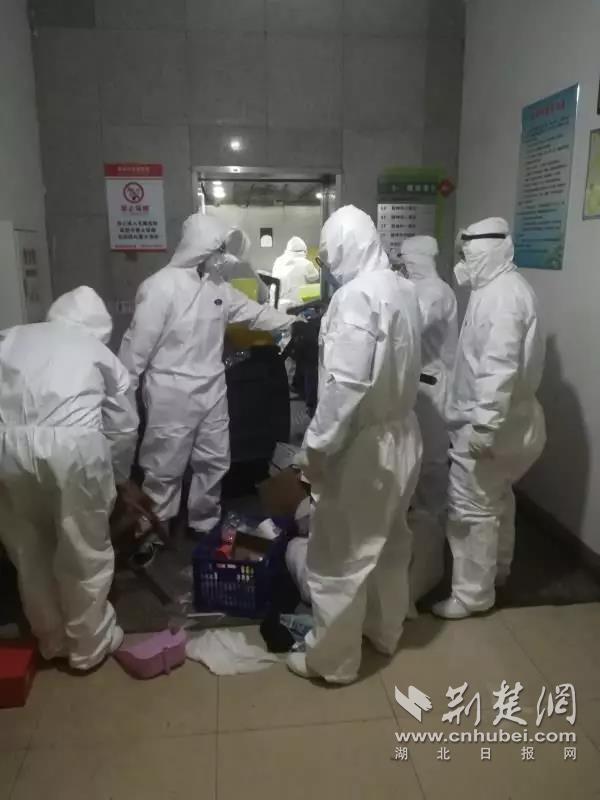
All the staff of the hospital urgently carried out the relocation and transformation in the hospital. Photo courtesy of correspondent
Time is tight and the task is heavy. There is no suitable office space, and a conference room less than 20 square meters serves as a design room, dispatching room, restaurant and rest stop for relocation and reconstruction planning; The elevator in the courtyard is not suitable for handling, so the relocated personnel will climb the stairs one by one to transport materials, and they will fight until the early morning for four consecutive days, and the WeChat step will average more than 30,000 steps for several days.
Where did the 900 beds and related medical materials come from under the current situation of city-wide closure? How to ensure the smooth travel of relocated people? To this end, the rear support personnel gave full play to the advantages of the retired military affairs department, and coordinated eight troops stationed in Han, military academies and military hospitals to urgently dispatch quilts, mattresses, sheets, masks, disinfectant and other scarce materials; At the same time, contact with the community where the relocated people live to ensure that the frontline personnel arrive at their posts in time and return home smoothly.
With the concerted efforts of the whole system of Qi Xin, on February 15th, 300 beds in Building No.2 in the old campus were put in place. On the 16th, 200 beds in Building 1 were in place; On the 17th, 400 beds in the new campus were put in place. At this point, all 900 beds have been assembled.
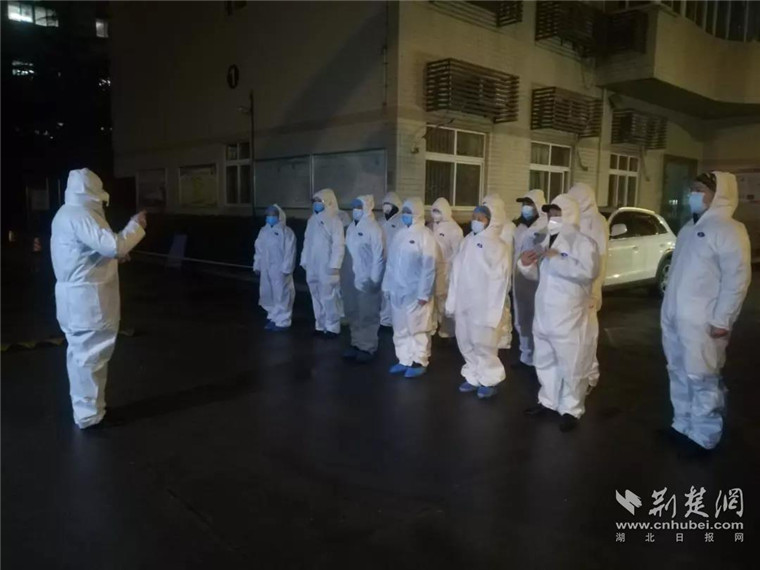
Party member cadres of the comrades-in-arms group helped the city’s special care hospital. Photo courtesy of correspondent
Medical staff in five provinces and regions rushed to the rescue.
If one side is in trouble, all sides will support it. On February 16th, 544 medical staff from Shanxi, Inner Mongolia, Guangxi, Yunnan and Gansu provinces (autonomous regions) rushed to Wuhan and rushed to the city’s special care hospital in batches to jointly carry out patient treatment.
On February 17th, five aid medical teams rushed into work and took over 12 wards of the hospital. At present, patients in two wards have been treated.
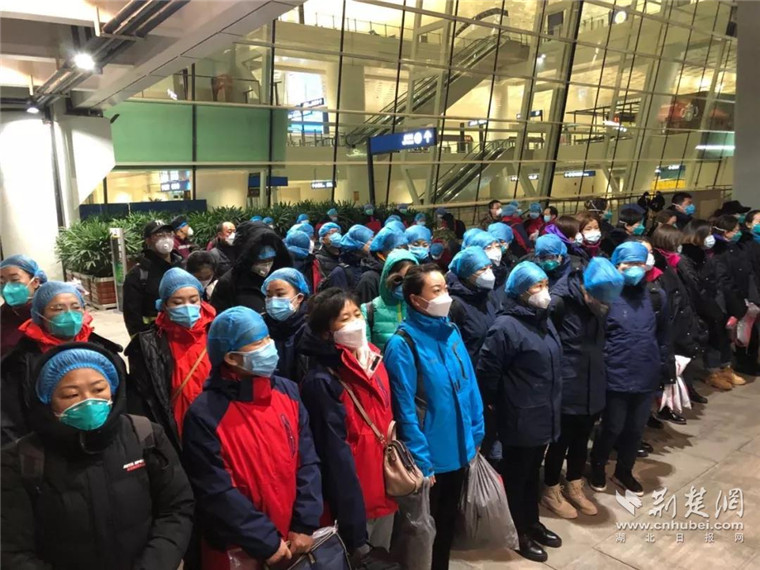
On February 16th, Inner Mongolia medical team arrived at Wuhan Tianhe Airport. Photo courtesy of correspondent
In order to do a good job in the supply of life support for the aid medical team, the Municipal Youfu Hospital has set up a special administrative class headed by the vice president to fully guarantee the needs of the medical team for in-hospital meals, the collection of protective equipment and the distribution of living materials. At the same time, a funding center composed of 20 medical staff was set up to help the medical team clean and disinfect protective articles, such as rubber shoes and goggles, daily, and to coordinate various protection and guarantee work.
As of 20: 00 on February 21st, the city’s Youfu Hospital has treated a total of 256 patients from COVID-19. At present, 251 patients from COVID-19 are being treated in the hospital (4 died and 1 was transferred). Among them, there are 53 elderly patients with severe diseases (average age over 75 years old) and 8 young patients with severe diseases (average age between 20 and 40 years old).
Epidemic prevention battlefield shows the true colors of retired soldiers
The special care hospital set up an isolation ward one month before the fixed-point transformation, which belongs to the high-risk zone of virus transmission. The relocation work has limited protection and heavy workload, so it is difficult to avoid exposure risks. At this time, five demobilized cadres of the Municipal Bureau of Veterans Affairs set up a resident assault detachment and organized more than ten demobilized cadres to fight one after another.
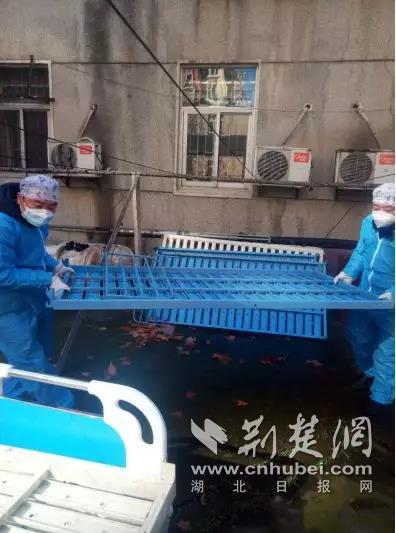
The "military assault squad" helped carry the hospital bed. Photo courtesy of correspondent
On February 15th, it snowed heavily, and the courtyard was brightly lit. Demobilized cadres took the lead in hard work, carrying heavy and hard-to-move materials such as sickbeds and cabinets upstairs and downstairs, regardless of the sweat soaking the back of clothes repeatedly, and kept working until 2 am the next day.
Shu Minjie, a demobilized cadre, took root in the unit. After fighting the epidemic for more than 20 days, a folding bed, a bowl of instant noodles and a disposable medical mask were all his equipment. "My wife and children have been sent back to their hometown, and I have no burden in fighting at the front line. I will take the initiative to ask for any task." Shu Minjie said.
Li Peng is a newly-arrived demobilized cadre in the Seventh Military Rest Center. After receiving the task, he entrusted his full-moon child to his parents, comforted his wife who had just given birth, and devoted himself to his work. He said: "The unit needs me. I am party member. I will go first. I am a retired soldier."